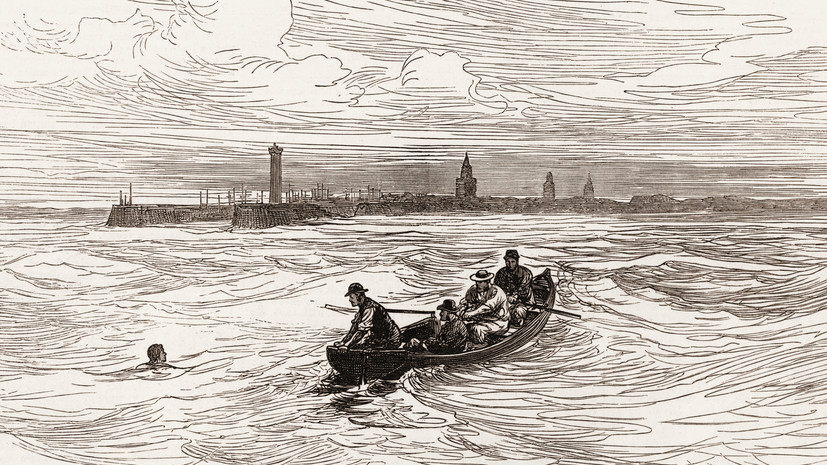On August 25, 1875, Briton Matthew Webb became the first person to swim across the English Channel without aids. It took him about 21 hours and 45 minutes.
Webb was born on January 19, 1848 in Dawley, Shropshire, into a large surgeon's family. Water has attracted him since childhood, he learned to swim well, training in the Severn River. And already at the age of 12 he decided to connect his life with the navy, dropped out of school and got a job as a cabin boy on a training ship.
For the first time, Matthew's fearlessness manifested itself in 1863. Then his brother Thomas, who could not swim, fell into the Severn, and Webb had to rescue him.
However, Matthew showed his fearlessness under more serious circumstances. At that time he was serving as the second mate on the steamer Russia, en route from New York to Liverpool. In the middle of the way, a violent storm began, and one of the sailors fell overboard. Without hesitation, the Briton dived into the icy water after his friend. Unfortunately, this time the rescue attempt was unsuccessful: the unfortunate man was never found, and Webb himself had to be pulled out of the water.
The sailor's feat not only impressed the passengers of the ship, but also made him famous throughout Great Britain. For his heroism, he was honored with the recently approved Royal Society for the Humanities and became a central figure in the local press.
Matthew had a brilliant career, he rose to the rank of captain, but decided to leave the fleet and challenge fate. He intended to do what no man had ever been able to do - to swim across the English Channel. He was inspired by an article about the first attempt made by professional swimmer George Johnson in 1972 and ended in failure.
Webb decided to focus on training. He had to overcome 32 km of the Strait of Dover (the narrowest part of the English Channel), but the difficulty lay not so much in distance as in unpredictable weather conditions. First of all, it was necessary to get used to the water temperature, which did not rise above +18 ° C in summer. For this, he trained in the Thames, Lake Hollingworth, as well as in the English Channel itself.
On August 12, 1875, Webb began his first swim, which, however, he had to interrupt after several hours of swimming. Strong winds and harsh weather conditions made it impossible. After 12 days, the weather finally improved and the athlete started again from the pier in Dover.
It is worth noting that three months before the Webb's swim, the English Channel was already crossed by the American Paul Boyton. However, his achievement was not counted as crossing the strait without aids, as he used a special suit. The Briton, on the other hand, had at his disposal a regular swimming suit and whale oil, which helped him to keep warm. On the way, he was accompanied by three rescue boats.
During the swim, the captain had to fight not only with an unstable current, because of which he had to swim not in a straight line, but in a zigzag path, but also with other difficulties. So, on the evening of the first day, a jellyfish stung him so badly that he practically lost consciousness. Brandy came to the rescue, which brought the swimmer to his senses.
The next day, when the coast of France was already visible on the horizon, Webb had to adjust the route so as not to get caught in the tidal wave. But on the morning of August 25, he still finished in Calais. In total, he covered 64 km in less than 22 hours and became the first person to cross the strait on his own.
It so happened that the passengers of the mail ship located near the coast witnessed the final part of the swim.
“I will never forget how the people on board delayed, or rather hoarsely sounded the song“ Rule Britain! ”. I got a lump in my throat when this old melody, which I had heard in all parts of the world, again reached my ears under such unusual circumstances. I felt that now I should have succeeded, and I really did it, ”Webb recalled.
Previous attempts to cross the English Channel further fueled interest in his person. However, success made the already popular Briton a real hero of his time, about whom the whole world knew. Needless to say, in his native Douley, he was greeted with all due honors - people took to the streets to greet him, and the brass band accompanied him all the way from the station.
Matthew never returned to the Navy, deciding to focus on his career as a swimmer. He made a living by participating in a variety of water shows both in the UK and abroad. For example, in one of them, he lasted 128 hours on the water.
Trying to swim across the whirlpool at the foot of Niagara Falls was Webb's last adventure. On July 24, 1883, he jumped into the water and successfully covered the first part of the distance. However, in the most dangerous area, he could not cope with the current and drowned.
“When we stood opposite each other, I compared that pleasant-looking stately sailor, as he was when we first met, with this broken and terribly changed likeness of a man who was now preparing to die in a raging maelstrom. His goal was not suicide, but money and eternal fame, ”wrote Webb's friend Robert Watson.
Many relatives of the swimmer confirmed that his immense popularity played a cruel joke on him. However, fortunately, he was remembered not for this, but for his greatest achievement, proving that nothing is impossible for a person. In honor of the outstanding native in Dawley, a monument is erected, the inscription on which reads: "All great things are not easy."

